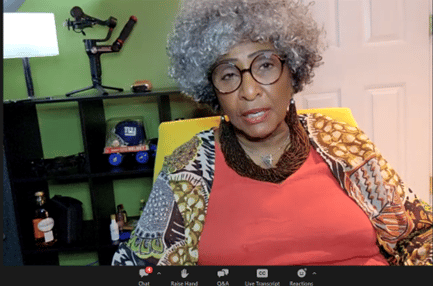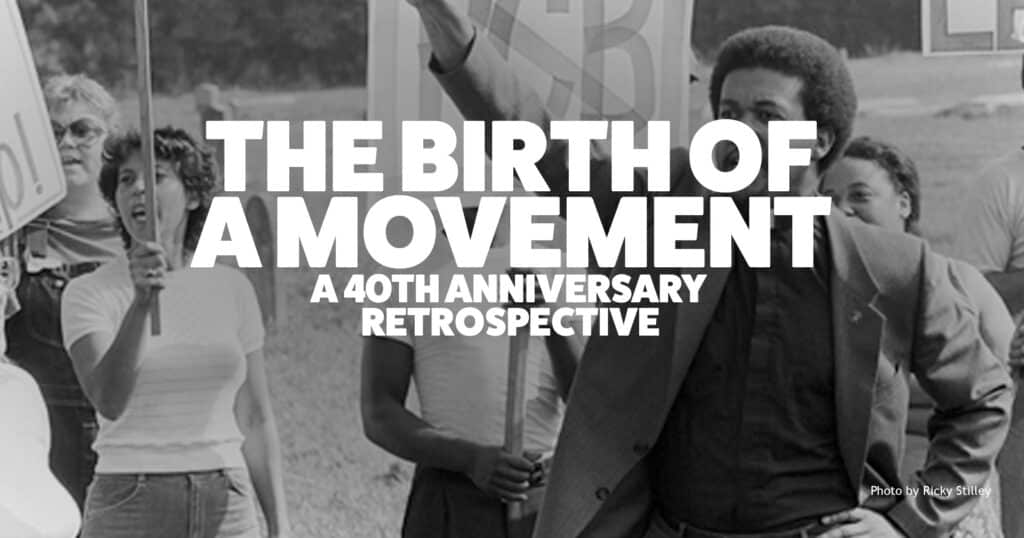‘We’re still in it,’ historic justice fighters say — and, by the way, ‘contact your senator’
People who got arrested in 1982 for fighting toxic dumping remembered those days — and described their hopes for today — to webinar viewers Sept. 14. And they joined younger activists in urging people to contact the U.S. Senate now about an urgent environmental policy vote.
History — and the need to keep on fighting — were both part of “The Birth of a Movement: A 40th Anniversary Retrospective.” The live event was recorded and is now available at the United Church of Christ YouTube channel.
The program, one of the UCC’s monthly Creation Justice Webinars, featured:
- UCC member Dollie Burwell. She organized residents of Warren County, N.C., to rise up — and, in some cases, lie down in front of trucks — when the state chose a local landfill as the place to dump soil contaminated with cancer-causing polycholorinated biphenyls, or PCBs.
- The Rev. Benjamin F. Chavis Jr. As a staff member of the UCC Commission for Racial Justice, he, too, was arrested in the Warren County protests, which lasted six weeks. He later headed that Commission — a predecessor of today’s Justice and Local Church Ministries — when it produced the landmark study, Toxic Wastes and Race in the United States.
- The Rev. William Kearney, pastor of Coley Springs Missionary Baptist Church in Warrenton, N.C., a center of support for the protests.
And before the webinar was over, two of today’s activists urged people to contact their Senators:
- Thaddaeus Elliott of the UCC’s Office of Public Policy and Advocacy in Washington, D.C., warned of environmental harm from certain energy permitting provisions being slipped into the congressional budget appropriations process. He urged people to use Interfaith Power & Light’s “Stop the Dirty Deal” tool to contact their senators. The process is moving fast, toward the start of the new fiscal year, Oct. 1. “They’re using the urgency of keeping our government running to pass all these other provisions,” Elliott said.
- The Rev. Michael Malcom of Alabama Interfaith Power & Light and the People’s Justice Council likewise urged people to add their names to the latter’s “No Dirty Deals” sign-on message.
‘Blatant act of racism’
The panelists shared memories of Sept. 15, 1982, the first day of protest. They recalled the four years of concern about toxic dumping that led up to it, and the six weeks of daily actions that followed it. And they discussed lessons learned for today.
Burwell recalled the emotions she and her neighbors felt when they learned the governor of North Carolina had targeted their county for toxic dumping and the U.S. Environmental Protection Agency wouldn’t stop it. There was, she said, “a sense of sadness, a sense of anger, a sense of powerlessness.” And there was fear.
Then, she said, she remembered a Christian scripture (2 Timothy 1:7): “… for God did not give us a spirit of fear, but rather a spirit of power and of love and of self-discipline.” She said that kind of faith gave her the strength to organize protests. And it gave the “poor and politically powerless community” of Warren County the will to “fight this blatant act of racism.”
‘Power in unity’
Kearney said the weeks of protest were a time when “everyday people found their voices.”
“There’s power in unity,” he said. “When we have a voice, and when we use our collective voice, we can begin to move the needle.”
Chavis called this month’s 40-year observances “an opportunity to rededicate ourselves to environmental justice, to climate justice, to racial justice … to justice for everybody.”
“What gives me hope today is that the movement is still alive,” he said, noting that, long ago, it grew into a multiracial, multicultural, global reality. “They use the term [environmental justice] at the United Nations, at the World Council of Churches, at the National Council of Churches.”
And he urged action, including grassroots organizing, registering voters and contacting Senators as described above. Taking to the streets in nonviolent protest still matters, too, he said. And all of it needs people of all ages. In Warren County, he recalled, “I saw children under 12 years old willing to lie down in the streets for freedom, justice and equality.”

Award named for Dollie Burwell
The UCC continues to contribute to the work in many ways, said the Rev. Brooks Berndt, minister of environmental justice. Immediately ahead:
- Nominations are now open for the UCC’s brand-new Dollie Burwell Prophetic Action Award. Information and a nomination form are available here, and more publicity will be coming soon. Nominees must have engaged in “a public action that was directed at an institution either responsible for an environmental injustice or responsible for addressing the ensuing crisis.” Those eligible are congregations, ministerial teams or other groups in the UCC who “have exemplified the tradition of prophetic action that runs from biblical times to today.” The winner will be announced at a UCC Earth Day Summit on April 22, 2023. More on that will also be announced in the coming weeks.
- “The Inflation Reduction Act: How it Can Benefit Faith Communities” will be the topic of the next Creation Justice Webinar, Oct. 12 at 1 p.m. ET. Topics will include how to navigate the new law’s alphabet soup of jargon when trying to take advantage of opportunities like funding for solar panels. People can register here.
A remark that Malcom made at the start of the Sept. 14 webinar, about still being “in it” — in the fight against environmental racism — drew appreciation from panelists throughout the webinar. Getting everyone to act is the key, he said. “When we all start participating, the fight will end, and we will win.”
“We’re still in it,” Burwell said. “But we’re going to fight to get out of it, to change it and to move forward.”
Content on ucc.org is copyrighted by the National Setting of the United Church of Christ and may be only shared according to the guidelines outlined here.
Related News
A Prophetic Call for Justice and Peace in Palestine
The executive leaders of the United Church of Christ have issued the following statement...
Read More‘Love is Greater Than Fear’: Regional Youth Events get to the heart of gospel message
United Church of Christ teens attending this summer’s Regional Youth Events (RYE) are...
Read MoreUCC desk calendars available to order now
Prepare for your day, month and year with the United Church of Christ desk calendar —...
Read More


